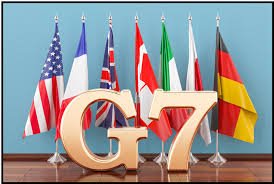G-7 must review its own purpose in a rapidly changing world
Welcoming leaders of 10 countries including Prime Minister Narendra Modi to the “G-7 Outreach” Summit, Italy’s Prime Minister Giorgia Meloni said it was important to step away from the old trope of the “West vs the Rest”. That sentiment explained Italy’s decision to invite mainly the Global South countries including BRICS notables such as Brazil, India, and the UAE, to hold an outreach with seven African countries on energy issues, and to host the summit in the Mediterranean Apulia region. The G-7 was once hailed as a dynamic group of the world’s most developed democracies where heads of state would roll up their sleeves once a year to effect real solutions to global financial and development issues. However, with manufacturing slowdowns, the COVID-19 pandemic, and the impact of the Russia-Ukraine conflict and western sanctions, the grouping has appeared more tired, and its meetings less effective. The shaky electoral fortunes of most of the G-7 leadership did not enhance that image at the summit. The joint communiqué read more like a laundry list of the world’s problems, than it did as a strong call to action on resolving them. Most salient was the G-7’s continued “military, budget, humanitarian, and reconstruction support” for Ukraine, but with no constructive plan on how to end the war. A Gaza ceasefire appeal has also not been accepted by Israel. The G-7’s focus on China in the Indo-Pacific and on “industrial targeting” and unfair practices was particularly sharp, but it remains to be seen whether any member-country will reduce its own considerable trade ties with Beijing. A line in the communiqué that recommitted to about eight infrastructure corridors, including the India-Middle East-Europe Corridor, reinforced the lack of focus on executing (as distinct from discussing) projects.
Given the G-7’s current situation, India, in attendance for the eleventh time, could well take stock of the engagement’s utility. While the event was an opportune moment for Mr. Modi, now in his third term, to meet with some of the world’s top leadership, the meetings themselves did not yield many outcomes. Formal bilaterals with the leaders of important partner the U.S., and fractious relationship-ridden Canada, did not materialise. Mr. Modi focused on India’s elections as a “victory for the democratic world”, on the importance of harnessing technology and artificial intelligence to bridge global inequalities, and on the value of the Global South, especially Africa. It would seem most of those issues would be better addressed in a larger and more representational format such as the G-20, while the G-7 may wish to review its own identity and purpose amidst a rapidly changing global power dynamic.
